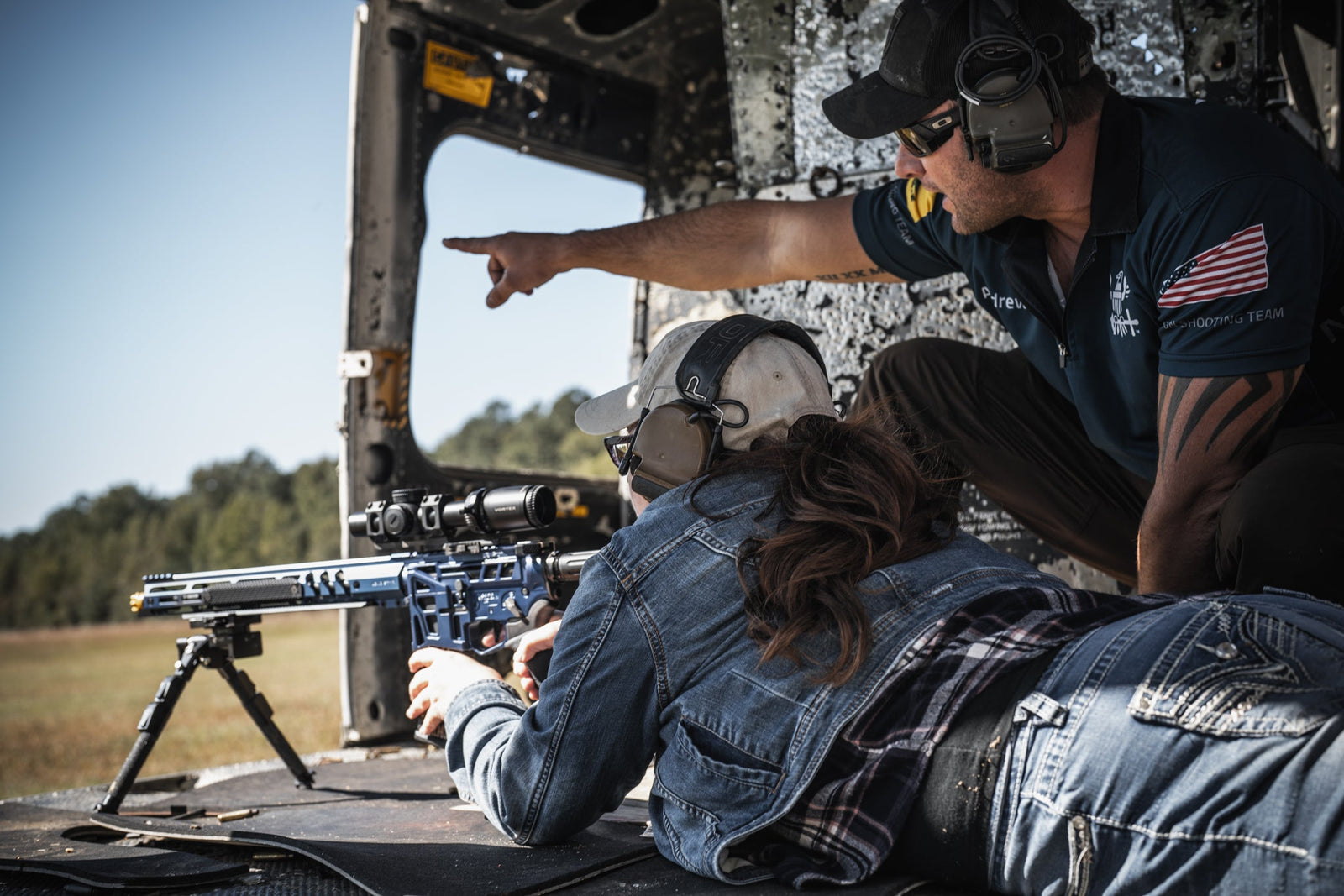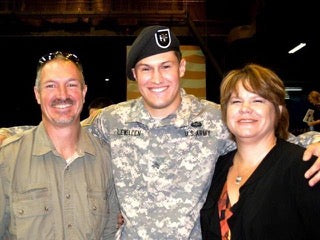Respect Campaign: Lauren Watine pt. 2
July 30, 2024

In the heart of the Maya Mountains, where the lush jungle meets the endurance of the human spirit, resilience becomes more than a trait—it transforms into a lifeline. For many, the concept of resilience conjures images of quiet determination and steadfast resolve. However, for those who dare to venture into extreme terrains and push their physical and mental limits, resilience is not just about enduring hardship; it's about thriving amidst it. Today, we delve into the inspiring story of Lauren Watine, a seasoned runner preparing for an arduous 70 - 100-mile trek through Belize’s Maya Mountains. We will explore the pivotal role of resilience, the balance between rigorous training and personal commitments, and the transformative power of overcoming setbacks.
With resilience at the core of her journey, we asked Lauren how this trait has influenced her ability to face challenges head-on. "I’ve found that resilience is often closely associated with flexibility: the ability to flex, to flow, to pivot in a new direction when something unexpected strikes out. Focus and commitment are important, but it’s crucial to recognize when it’s time for a new approach. I’ve been training for a very big and very personal running objective of 70-100 miles through the Maya Mountains in Belize. My original goal was to complete this project for May/June 2024 – a race to beat the rainy season, which will make this already challenging objective that much more complicated to accomplish logistically. But after several months of personal and professional obstacles that included illness, injury, and compounding life stressors, I chose to pivot. I chose to reorder when to complete this project to ensure the greatest chance for success. Because there’s no point in sticking to a timeline that won’t advance the objective.”
Balancing intense preparation with other life commitments is no easy feat. We explored how she manages this demanding equilibrium. "Time management is everything. Time management, establishing boundaries, and effectively communicating those boundaries are all key, especially in a field like mine where you are often living and working with your colleagues. This can give the impression of always needing to be “on” and available to work, and also an expectation that your colleagues have access to you whenever they want. Clearly communicating my needs and schedule and being committed to my work/life boundaries is super important. When I began working in other countries, I established a routine with my family that I would call them twice a month on Sundays to catch up. This often meant integrating and planning those calls into a day that included both training sessions and work. Time management allows me to accomplish all of those tasks while also having time for myself."
We asked her to share a personal experience about the inevitability of setbacks during a challenging pursuit and how it contributed to her growth. “Something fascinating happens when we commit to pursuing something outside of our comfort zones, especially when that pursuit is personal; on the heels of that commitment comes failure. Extraordinary failure. In volume, in depth, in breadth. The path you’ve set your feet on diverges, and each new branch looks the same or as good as any other branch. If you overcome the decision fatigue and make a choice to follow one branch, inevitably it dead-ends, or it has obstacles, or it becomes ever more narrow to the point where you’re fighting a wall of dense underbrush and trees and have to navigate your way back to some sort of pathway.

Yet, if we approach each of these failures or ‘false trails’ as a learning moment, a chance to grow and synthesize the lessons learned so that we don’t repeat the same mistake – is it a failure, at that point? That’s how these last 2 years have looked for me. I had committed to fulfilling my dream of working in and giving back to the people and wild places in Belize that have given me so much. I went there in 2022 intending to live there, and 6 months after arrival everything had fallen through. My funding, my workplace environment, and even a place to call home. All I had were the 2 duffel bags I arrived with and a vision I still hadn’t made into reality. It was a call to take several steps back and look at the bigger picture.
Making a dream into reality takes time, effort, and hard work. This wasn’t a failure. This was a moment to recognize that the path I was on was simply a dead-end. It wasn’t a mechanism toward success that was going to allow me to remain true to myself. The same can be said for what followed: another path I explored was a dead end for the same reason. It highlighted for me the need to take full responsibility for breathing life into my dream and being committed to playing the long game. Failure and setbacks have only ever done one thing to me: stoked the fire to see a thing made into reality. Sometimes, this has been to my detriment. There’s nothing heroic in staying committed to a thing unless it is YOUR thing. Don’t destroy yourself for someone else’s expectations or dreams, but you DO whatever it takes to make YOUR vision a reality."
We asked her advice for someone going through similar obstacles or challenges on their journey. "Know your 'why.' You will question yourself. You will doubt yourself. You will see other people appearing to be successful and wonder if you’re doing the right thing, pursuing something so far outside of the scope of what others consider normal. As long as you have your “why” to refer back to, you WILL overcome the obstacles and challenges you face. But if you don’t know why you’re pursuing your journey, you don’t have a reason to try to continue moving forward. Know your why."
Reflecting on her background, we asked Lauren how her experience as a Wilderness First Responder has influenced her approach to goal-setting and achievement. "I’ve been a Wilderness First Responder (WFR) since 2016, and I credit that training with my ability to be nonreactive in charged situations. The repetition in training gives you the confidence to triage; the methodical approach is almost a meditation. My WFR training also helped emphasize the importance of thinking about the big picture, which I think was perfectly condensed into the phrase, “Seconds never count and minutes rarely do.” This means that while making decisions is important and necessary, there is always time to take some moments to determine the best plan of attack. If those moments don’t exist, well, you, potentially your patient, or even the goal are dead anyway.

I’ve experienced many emotionally charged moments with people who have become patients in the backcountry. I’ve experienced other moments where suddenly I am my own patient, miles from a vehicle, and I have to decide how best to get myself back to health and safety. There is a lot of freedom in knowing that I can call on that calm and rational approach at any moment."
Recognizing the mental fortitude required for such endeavors, we asked her to share a defining moment that underscores the importance of mental toughness. "When this took place, I was on a 3-hour training run. In the week leading up to that run, I felt like I was in some of the best physical running conditions of my life. It led to this feeling of invincibility, and if you’ve ever hit a peak in physicality, you’ll know what I mean. You get a kind of swagger in your step, a glow of confidence, and just when you think you have nothing to worry about, this is the moment to REALLY worry because you’re dancing on the knife’s edge where you could just as easily fall off into injury as increase your fitness. I’ve been on that razor-thin edge several times, and I knew it could just as easily go my way as not.
Turns out, that 3-hour run was a nice reality check: I thought my body and mind were in sync, but it turns out that they weren’t, and my body let me know by refusing to run mileage and vertical that I’d been doing in my sleep for weeks. Having the mental toughness to accept what IS, and not what you WANT, is what separates those who are committed from those who are interested. When you’re committed you refuse to quit, even if it means a substandard output. Mental toughness also requires a sort of humbleness because you usually need to call on that quality in a moment when things aren’t going the way you expected. It’s an acknowledgment that maybe you made a mistake and now you have to find a way to hold yourself accountable so that you can complete the objective."
Finally, we delved into the practical aspects of her preparation by asking how the right gear contributes to her performance and mindset. "There are a thousand things to think about when training and then synthesizing all of that preparation into the final day of competition: Do I have food, water, water treatment, sunscreen, lip balm, compass, headlamp, and my Individual First Aid Kit? Do I know where my water sources are? If I have to spend the night in the jungle for unforeseen reasons, do I have what I need to be safe? Are my communications devices charged? What signs and symptoms am I looking for in my body and mind that tell me, ‘I need to bail’? If I do need to bail, what is my exit strategy?

When you commit to self-supported adventures in the way I do you are constantly evaluating and reevaluating the conditions yourself. One mistake could mean serious injury and in some cases life or death. The last thing I want to worry about is my gear, and I consider my clothes to be part of that category. It should be something I never have to think about because I trust and I know that it works.
For the past year, I've relied on the Catalyst Luxe shirts during my most demanding adventures. From intense training runs in the humid jungles of Belize to extended 7-10 day treks through the rugged terrains of Chilean Patagonia, these shirts have been a constant companion. Despite the weight of my packs, the material remains durable and shows no signs of pilling. I've pushed these shirts to their limits, wearing them for three consecutive days in the jungle and up to a week in alpine and steppe environments before needing to give them a rinse. They offer reliable protection from the elements—be it sun, rain, heat, or cold—without requiring any adjustments to my routine. The assurance that my gear will perform as needed allows me to concentrate fully on the challenges ahead, ensuring that I can perform at my best when it matters most."
Lauren’s journey to and through the Maya Mountains, much like any significant personal endeavor, is not merely a test of physical endurance but an earnest exploration of resilience, balance, and adaptability. In our conversation, we explored the importance of resilience in overcoming unexpected challenges, the necessity of balancing rigorous training with personal commitments, and the transformative power of setbacks. Additionally, we discussed the critical role of mental toughness and the tangible impact of reliable gear on performance and mindset.
For anyone embarking on a similar journey, remember the power of knowing your 'why.' This foundational understanding not only fuels your perseverance but also guides you through the inevitable trials along the way. Just as resilience in the Maya Mountains is about thriving amidst hardship, Lauren's story illustrates how flexibility and strategic pivots are essential for success in any challenging pursuit. In the end, the path to success is rarely a straight line. It is the winding, arduous trails that often lead us to the most profound insights and growth.
Also in Ascend Together Initiative

Memorial Valor Foundation
April 25, 2025
Memorial Valor Foundation's mission is clear and unwavering—to remember, honor, and memorialize fallen Special Operators by providing support to their Gold Star families, and the SOF families whose loved one is no longer with us. They achieve this through annual flagship events like the Memorial 3-Gun Competition, along with newly introduced galas, golf tournaments, and skeet shoots. Each event uniquely commemorates heroes by sharing their stories, celebrating their legacies, and providing vital support to their families.

Stories of Honor: Matthew Lewellen
December 31, 2024

Stories of Honor: Don McFaul
December 20, 2024
After stepping away from the Navy in 1985 to pursue civilian life, Don soon realized that the challenges, camaraderie, and sense of purpose within the SEAL Teams were irreplaceable. He returned to the Naval Special Warfare Community in 1988, sharpening his skills at the Defense Language Institute for Spanish before joining SEAL Team FOUR. His deployments took him across the globe, including missions in the Persian Gulf and Panama, where he served with Naval Special Warfare Unit EIGHT.
We live life dialed to eleven.
Get discounts, stories, and more from Terra Arma delivered to your inbox.
